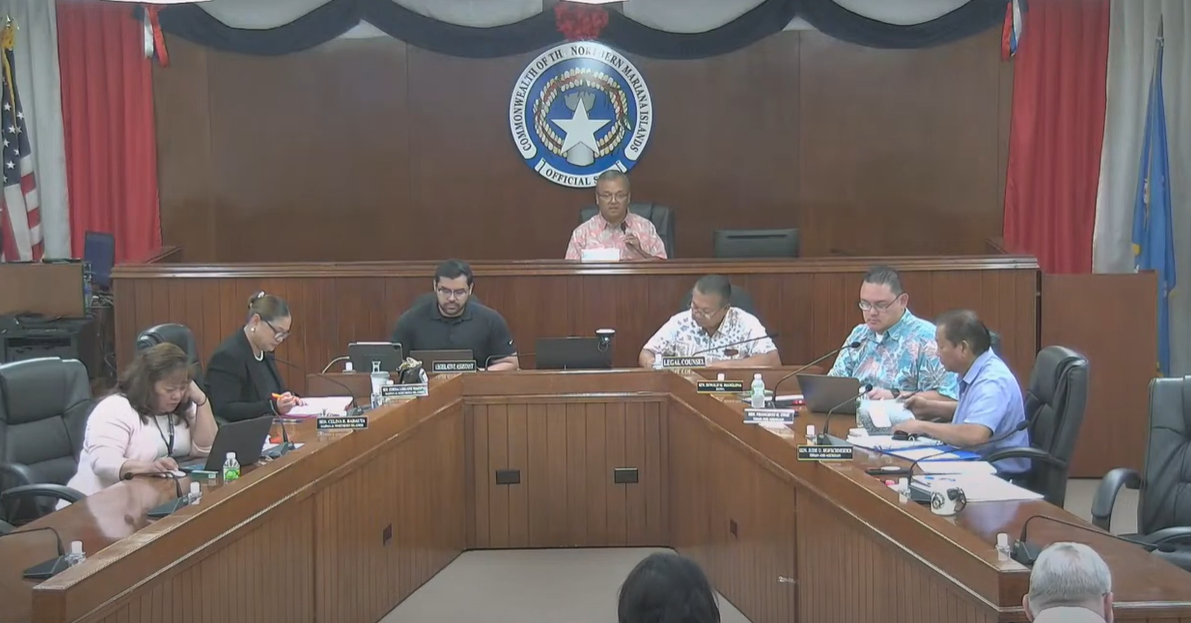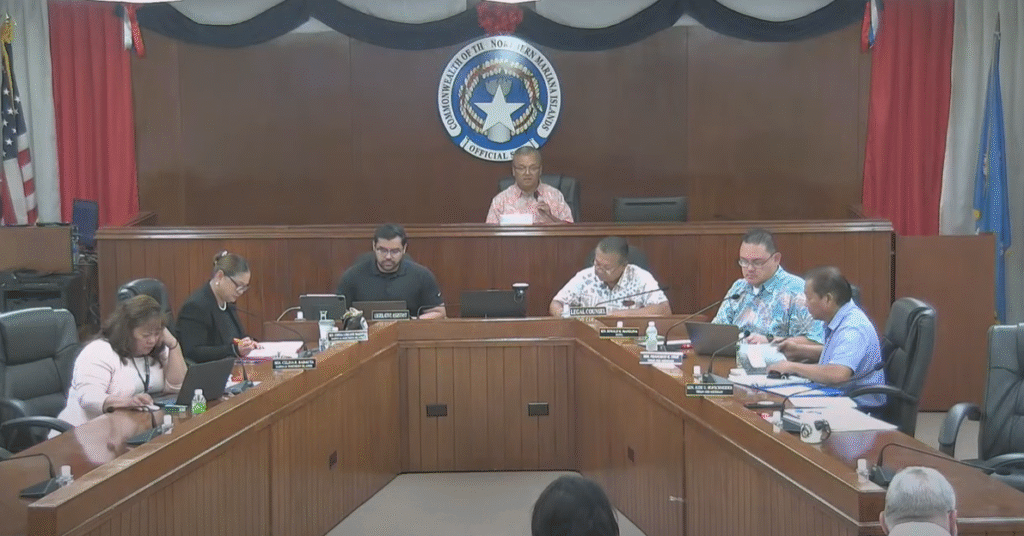
Sen. Paul A. Manglona, center background, presides over a public hearing conducted by the Senate Committee on Public Utilities, Transportation and Communications, which he chairs, on Wednesday in the Senate chamber.
THE Senate Committee on Public Utilities, Transportation and Communications on Wednesday heard opposing testimonies on House Bill 23-97, which would create a revolving fund to allow the Commonwealth Public Utilities Commission to handle its own expenses, including monthly compensation for its members.
Authored by Rep. Vincent S. Aldan, H.B. 23-97, which passed the House on March 28, 2024, proposes to provide the CPUC chair with $1,000 monthly compensation, and the commissioners, $800 a month. The bill would also allow the commission to hire an executive director and staff members.
The bill aims to “to guarantee the proper payment of [the commissioners’] extra time and expenses to regulate…important utility entities, and to also entice highly qualified candidates to accept all the responsibilities of the CPUC’s many challenges to protect and preserve the fair and reasonable costs of the CNMI public utilities.”
Conducting the hearing were the committee chairman, Sen. Paul A. Manglona, vice chair, Senate Floor Leader Corina Magofna, and members, Senate Vice President Donald Manglona, Sens. Celina Babauta, Frank Q. Cruz and Jude U. Hofschneider.
Aldan appeared before the committee to reiterate the importance of CPUC, and why he introduced H.B. 23-97.
He said CPUC was created to regulate CUC, but if the commission doesn’t have financial stability, “it would hinder their ability to hire private counsel or experts or anybody they need, which would hinder their operation…and…make it difficult for the Commonwealth Utilities Corp. as well to operate in a manner that is beneficial to the whole community.”
Aldan added, “Just the job of the commissioners themselves is daunting. It is practically a full-time job if you look at their duties and responsibilities. That is why I included a compensation package for them in the bill, because it’s only fair.”
Aldan said it’s “imperative” that CPUC becomes financially independent.
“Right now, CPUC has no employees. So they’re stuck, they can’t do anything because they don’t have the resources,” he added.
Expenses
CPUC Chairman James Sirok, a former CUC legal counsel, said before CPUC lost its quorum, it acted “pretty much independently.” It had its own bank account, which allowed the commissioners to make payments for expenses they incurred, including payments to a hearing officer and an attorney.
Now that CPUC has enough members to constitute a quorum, Sirok said they want to remain financially independent.
However, current law states that any funding the commission gets must come from a revolving fund overseen by the Department of Finance.
In November last year, Sirok said the commission submitted a “small” funding request for the cost of publishing meeting announcements, and for paying the stipends of the commissioners for four meetings. For three of the meetings, each commissioner should get $30, while for the other meeting each should get $60.
Sirok said he had not received any payment as of Wednesday because the commission still had to go through several steps required by the government.
He said the real intent of H.B. 23-97 is to make the commission more independent with its own revolving fund, which the commissioners can place in a bank account and have access to.
He said the bill would ensure accountability because the commission must submit annual reports to the Legislature and the Office of the Public Auditor.
He added that the bill would make it clear that the commission is an independent entity and not an administrative department within the executive branch.
Current law states that the commissioners “shall [receive] no more than $60 for a full-day meeting and no more than $30 for a half-day or less meeting; provided that the compensation shall not exceed a maximum of $6,000 per year.”
Careful now
CUC Board Chair Janice Tenorio, for her part, testified against the bill. While its intention is undoubtedly well-meaning, she said, “I believe it is imperative to carefully consider the implication of [the bill] to the integrity and effectiveness of CPUC.”
She said the proposal to compensate the commissioners on a monthly basis, and the creation of the position of executive director and the hiring of additional staff members, “raises a significant question about the fundamental principles underlying the purpose of public service and the efficiency of the regulatory bodies.”
She said the tradition of having uncompensated commissioners “is rooted in the concept of public service.” Commissioners, by virtue of their roles, Tenorio said, are entrusted with the responsibility of safeguarding the interest of the community without the expectation of financial gain.
“Introducing monetary compensation,” Tenorio said, “may inadvertently compromise the impartiality and dedication of public service that are essentially the quality of effective commissioners.”
Moreover, she said, the suggestion to expand the CPUC bureaucracy with the appointment of an executive director and staff members “runs counter to the notion of streamlined and efficient governance.”
She said CPUC, like many regulatory bodies, should prioritize a direct engagement with the issues at hand. Delegating essential duties will diminish the accountability of the commissioners and introduce “unnecessary bureaucracy hurdles that would impede a timely decision-making process,” she added.











